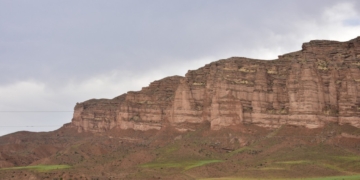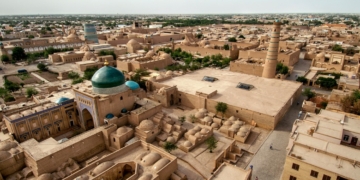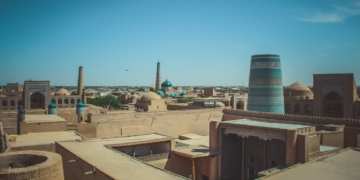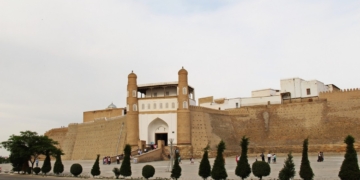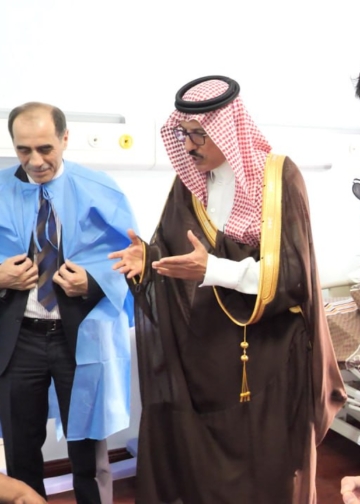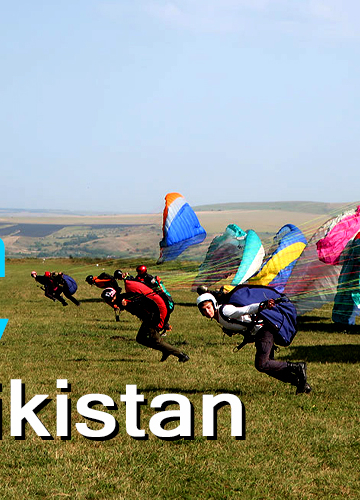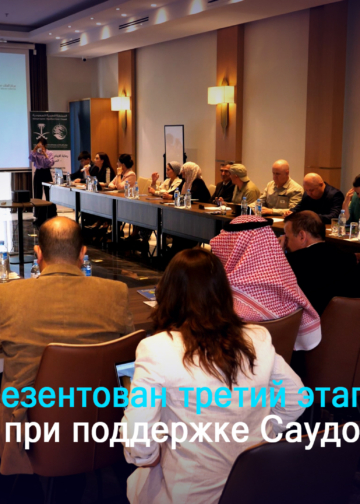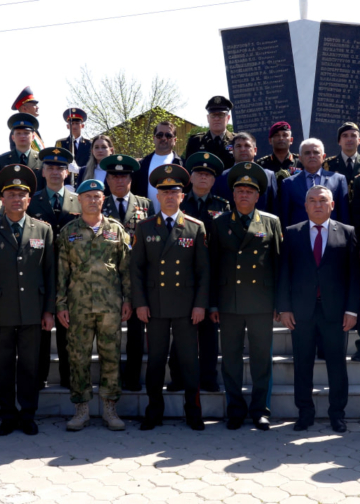id: 178110
date: 11/13/2008 11:47
refid: 08TASHKENT1306
origin: Embassy Tashkent
classification: CONFIDENTIAL
destination: 07TASHKENT1494|07TASHKENT1975|07TASHKENT459|08TASHKENT608
header:
VZCZCXYZ0001
RR RUEHWEB
DE RUEHNT #1306/01 3181147
ZNY CCCCC ZZH
R 131147Z NOV 08
FM AMEMBASSY TASHKENT
TO RUEHC/SECSTATE WASHDC 0584
INFO RUEHZG/NATO EU COLLECTIVE
RUEHAH/AMEMBASSY ASHGABAT 4482
RUEHTA/AMEMBASSY ASTANA 0699
RUEHEK/AMEMBASSY BISHKEK 5099
RUEHLM/AMEMBASSY COLOMBO 0966
RUEHDK/AMEMBASSY DAKAR 0396
RUEHDBU/AMEMBASSY DUSHANBE 0978
RUEHIL/AMEMBASSY ISLAMABAD 4716
RUEHBUL/AMEMBASSY KABUL 3003
RUEHKT/AMEMBASSY KATHMANDU 1002
RUEHMO/AMEMBASSY MOSCOW 7657
RUEHNE/AMEMBASSY NEW DELHI 1662
RUEHGV/USMISSION GENEVA 1579
RUEHVEN/USMISSION USOSCE 2933
RUEKJCS/SECDEF WASHINGTON DC
RHEFDIA/DIA WASHDC
RUEAIIA/CIA WASHDC 0401
RHEHNSC/NSC WASHINGTON DC 0548
—————— header ends —————-
C O N F I D E N T I A L TASHKENT 001306
SIPDIS
DEPT FOR SCA, DRL, PRM, AND DHS/USCIS
PRM FOR MATTHEW JOHNSON, MOSCOW FOR SUSANNE SINCLAIR-SMITH
AND SUSANNE GIBBONS
E.O. 12958: DECL: 11/13/2018
TAGS: PREF, PHUM, PGOV, PREL, SOCI, UNDP, UNHCR, AF, TI, UZ
SUBJECT: UZBEKISTAN: AFGHAN REFUGEES STILL ENDURE
HARRASSMENT; DEPORTATIONS
REF: A. 07 TASHKENT 1975
B. TASHKENT 608
C. 07 TASHKENT 459
D. 07 TASHKENT 1494
Classified By: POLOFF R. FITZMAURICE FOR REASONS 1.4 (B, D)
1. (C) Summary: The United
Nations Development Program
(UNDP) office in Tashkent reports that Afghan refugees with
United Nations High Commissioner for Refugees (UNHCR) mandate
status in Uzbekistan continue to face harassment and
occasional deportation at the hands of authorities.
According to UNDP — which assumed responsibility for
monitoring the welfare of mandate refugees after UNHCR was
forced to close its office in Uzbekistan in 2006 — there are
approximately 944 mandate refugees, mostly Afghans, remaining
in the country. Many of the
remaining mandate refugees are
reportedly ineligible for resettlement in third countries due
to past associations with the former Soviet puppet regime in
Afghanistan or are the children of such individuals. Poloff
also spoke with the directors of two local NGOs providing
humanitarian assistance to
refugees, who explained that
growing numbers of new refugees without mandate status were
fleeing Afghanistan for Uzbekistan.
In addition, they
reported that some stateless individuals from Tajikistan have
been granted Russian citizenship by the Russian Embassy in
Tashkent. We are disappointed
that Afghan refugees in
Uzbekistan continue to face harassment and even deportation
at the hands of Uzbek authorities, but at least the
government has not carried out large-scale deportations of
Afghan refugees, which it threatened to do last year (ref A).
2. (C) Post continues to provide
as much assistance as
possible to the remaining Afghan refugees. Through the State
Department’s Taft Fund for Refugees (ref B), post has given
20,000 dollars in funding this year to support the operations
of the two local NGOs providing humanitarian assistance to
refugees. A team from DHS/USCIS
will be in Tashkent next
week to interview some of the remaining Afghan refugees (and
other asylum seekers) for possible resettlement in the United
States. End summary.
UNDP REPORTS AFGHAN REFUGEES STILL HARRASSED, DEPORTED
——————————————— ———
3. (C) During a recent meeting,
UNDP Deputy
Resident Representative Kyoko Postill told poloff that Afghan
refugees in Uzbekistan continue to face harassment and
occasional deportation at the hands of Uzbek authorities.
According to her, in the past four months, at least four
families of Afghan refugees have been forcibly deported from
Uzbekistan to Afghanistan, while the number of refugees that
have been temporarily detained by Uzbek authorities is much
higher. UNDP has sent complaint
letters to the MFA following
each detention, but so far it has not received any response
from the MFA.
4. (U) Note: In 2006, Uzbek
authorities forced the closure
of the United Nations High Commissioner for Refugees (UNHCR)
office in Tashkent after it assisted Uzbek refugees who fled
into Kyrgyzstan following the 2005 Andijon events. Since
that time, the UNDP office in Tashkent has monitored the
welfare of refugees with UNHCR mandate certificates in
Uzbekistan. In March 2007, the
government announced that
UNHCR mandate certificates would not be considered as the
basis for extended legal residence, and persons carrying such
certificates must apply for the appropriate visa or face
deportation. The government
appeared to be effectively
ending an agreement with the UNHCR in place since 1999, under
which the government had tolerated the presence of mandate
refugees despite not having ratified the 1951 Convention on
Refugees and its 1967 protocol.
In 2007, there were several
reports of police detaining Afghan refugees and forcibly
deporting them back to Afghanistan (refs A, C, and D). End
note.
SOME, BUT NOT ALL, AFGHAN REFUGEES ARE ECONOMIC REFUGEES
——————————————— ————
5. (C) The Uzbek government
frequently complains that the
Afghan refugees in Uzbekistan are economic refugees,
according to Postill. She
admitted that some of the Afghan
«refugees» in Uzbekistan were wealthy individuals who
traveled back and forth between Uzbekistan and Afghanistan
for business. However, she
believed that these businessmen
were a minority, not a majority, of the remaining Afghan
refugees. UNDP conducted a
validation study in early 2008 to
weed out economic migrants among the Afghan refugees and as a
result, some individuals were removed from the list of UNHCR
mandate refugees. She believed
that the businessmen who were
removed from the list could easily afford to purchase Uzbek
visas to normalize their status inside of Uzbekistan.
MANY OF REMAINING REFUGEES INELIBIGLE FOR RESETTLEMENT
——————————————— ———
6. (C) According to UNDP’s
records, there were approximately
944 mandate refugees, mostly Afghans, remaining in Uzbekistan
(Note: This is decline from the 1,284 mandate refugees which
was reported in July 2007, see ref D. End note.)
Postill
believed that many of the remaining Afghan refugees were
ineligible for resettlement in the United States or other
countries because of their past associations with the Khad,
the intelligence service of the Soviet puppet «People’s
Democratic Republic of Afghanistan» regime. She reported
that UNDP and UNHCR were still encouraging other countries,
including Norway and Sweden, to accept additional refugees,
but she believed that at least half of the remaining refugees
would be difficult to resettle because of their past
associations.
UNDP STILL INVESTIGATING OTHER OPTIONS
—————————————
7. (C) Given the continued
pressure on Afghan mandate
refugees and the difficulty of resettling them in third
countries, UNDP and UNHCR have reportedly examined other
options. Postill explained that
UNDP and UNHCR tried to
encourage some of the Afghan refugees to voluntarily return
home, but only a few families have so far done so. UNDP also
has encouraged the Uzbek government to grant Uzbek
citizenship to those Afghans who have married Uzbek citizens,
but to no avail. Postill noted
that if the government does
move to deport large number of mandate refugees, UNDP will
have to consider taking more drastic measures, including
moving the remaining refugees to either Kyrgyzstan or
Kazakhstan. However, she said
that UNDP was only discussing
this possibility internally at the moment. She also added
that UNHCR was consolidating its operations in Central Asia
in Almaty and could close its office in Bishkek.
NGOS CONFIRM UNDP’S REPORTS ON AFGHAN REFUGEES
——————————————— —
8. (C) Poloff also met recently
with the heads of two NGOs
providing humanitarian assistance to Afghan refugees in
Uzbekistan: the Tashkent-based International Professional
Education Development Assistance Center (PROFED) and the
Termez-based Ayol va Zamon Surkhandarya Regional Center for
Increasing the Socio-Economic Activity of Women and Youth.
The NGO directors confirmed that UNHCR mandate refugees from
Afghanistan continue to face harassment and occasional
deportation at the hands of Uzbek authorities. PROFED
directors Pavel Ionkin and Natalya Krokhmal and Ayol va Zamon
Chairperson Gulnora Khodjaniyazova noted one extreme case
where Afghan refugees who had already been selected for
resettlement in Canada — including six families from Tashkent
and two families from Termez — were deported earlier this
year to Afghanistan by Uzbek authorities. As far as the NGOs
knew, the individuals were still in Afghanistan and have not
yet been resettled in Canada.
9. (C) According to the NGOs, the
refugees continue to
experience frequent harassment, including authorities tearing
up their UNHCR mandate certificates.
UNDP has reportedly
issued the Afghans new mandate certificates after they have
been destroyed by Uzbek authorities.
The NGOs also operate
hotlines that refugees can call when they are in trouble.
The NGO directors explained that Afghan refugees are held at
the Bektamir detention facility in Tashkent, where, according
to Uzbek law, they can be kept for up to six months before
being deported. The NGO directors
reported that, in some
instances, they have been able to intervene on behalf of
refugees and have them released, including by paying bribes
when necessary. The PROFED
directors said that they had
visited Bektamir on one occasion, and found conditions there
to be tolerable, «no different than any other prison or
detention facility in Uzbekistan.»
The PROFED directors
added that they had approached the Afghan Embassy in Tashkent
on behalf of Afghan refugees, but found that it was generally
reluctant to provide assistance.
COMPOSITION OF MANDATE REFUGEES FROM AFGHANISTAN
——————————————— —
10. (C) Of the roughly 1,000
mandate refugees remaining in
Uzbekistan, the NGO directors reported that most of them
either had ties with the Khad or were the children of such
individuals. Roughly two-thirds
of the mandate refugees were
adults, while one-third of them were children. Most of the
refugees lived in Tashkent, while approximately 150 of them
lived in Termez, according to Khodjaniyazova. The NGO
directors noted that the overall number of mandate refugees
in Uzbekistan has declined considerably from 2006 — when more
than 2,000 of them lived in Uzbekistan — thanks to
resettlement in third countries, including the United States.
MOST AFGHAN REFUGEES STRUGGLE TO SUPPORT THEMSELVES
——————————————— ——
11. (C) The NGO directors noted
that many Afghan refugees
struggled to make ends meet in Uzbekistan. Most of them
cannot find work, while their children are unable to attend
Uzbek schools. The refugees also
experience social
prejudice, as many Uzbeks view them as criminals or drug
users. The PROFED directors reported that UNHCR and UNDP
provided some limited financial aid to the mandate refugees,
providing each family with between 30 and 50 dollars a month.
Ionkin and Krokhmal noted that
many of the refugees suffered
from medical and mental ailments, and that it was difficult
for them to receive appropriate treatment.
12. (C) The NGO directors
acknowledged that some of the
Afghans were economic refugees, but noted that they were a
minority. They also explained
that many of the refugees were
still afraid to return to Afghanistan.
Ionkin and Krokhmal
reported that a 2005 survey of refugees showed that only 2
percent of them wished to return.
They added that some of
those who have been deported by Uzbek authorities have
returned to Uzbekistan again due to safety concerns.
NEW AFGHAN REFUGEES REPORTEDLY CROSSING THE BORDER
——————————————— ——
13. (C) The NGO directors said
that growing numbers of new
refugees from Afghanistan, who lacked mandate status, were
coming to Uzbekistan. While some
of the new individuals are
economic refugees, others are reportedly fleeing the growing
violence in Afghanistan. These
new Afghan refugees are
unable to acquire mandate status in Uzbekistan, due to the
closure of UNHCR’s office in 2006.
PROFED has assisted some
of the new refugees travel to UNHCR’s office in Bishkek,
Kyrgyzstan, to receive mandate certificates and await
resettlement in third countries.
However, the NGO directors
said that many of the new Afghan refugees have been detained
and deported by Uzbek authorities.
TAJIK REFUGEES AND STATELESS PERSONS
————————————
14. (C) The NGOs reported that
the situation for Tajik
refugees, most of whom came to Uzbekistan during the Tajik
civil war in the 1990s, was much less severe than for Afghan
refugees. Unlike the Afghan
refugees, many of the Tajik
refugees are ethnic Uzbeks, and therefore face fewer social
prejudices and are generally able to assimilate into local
communities and find work, albeit illegally. Many of the
Tajik refugees have only old Soviet Union passports and have
become stateless. According to
the NGOs, there were roughly
250 stateless persons registered with UNHCR in Uzbekistan,
almost all Tajik refugees. In
addition, the NGOs estimated
that there were approximately 3,000 unregistered cases of
stateless persons from Tajikistan in Uzbekistan.
SOME STATELESS INDIVIDUALS RECEIVE RUSSIAN CITIZENSHIP
——————————————— ———
15. (C) The NGO directors
reported that some Tajik refugees
with old USSR passports have been granted Russian citizenship
by the Russian Embassy in Tashkent.
They noted that the
process for receiving Russian citizenship was complicated and
required paying a significant registration fee.
16. (C) Poloff knows personally
one Tajik refugee, the
husband of an Embassy employee (protect), who was granted
Russian citizenship after living in Uzbekistan for many years
as a stateless individual. Uzbek
authorities refused to
grant the husband Uzbek citizenship, despite the fact that he
was ethnically Uzbek and married to an Uzbek citizen.
Roughly five years ago, the husband was granted Russian
citizenship and a passport by the Russian Embassy in
Tashkent. The Embassy employee
added that she knew several
other stateless individuals from Tajikistan in Uzbekistan who
have likewise been granted Russian citizenship over the
years. The Embassy employee
believed that Tajik refugees
could freely return to Tajikistan and receive Tajik
citizenship (she knew of at least one case of this
occurring), but she noted that most of the refugees were
reluctant to return to Tajikistan due to bleak economic
prospects there.
17. (C) Recently, however, the
husband has faced serious
difficulties renewing his Russian passport and is in danger
of becoming stateless again.
Russian Embassy officials
refused to renew his passport last month, claiming that his
name did not appear in an internal list of Russian citizens
in Uzbekistan. The Embassy
employee reported hearing rumors
that officials at the Russian Embassy have demanded bribes in
exchange for granting Russian passports to individuals in
Tashkent and speculated they would also
seek to eventually
extort a bribe from her husband (Note: We are unable to
confirm these rumors. End
note.) Last week, two officials
at the Russian Embassy in Tashkent, including the Consul,
were killed in a car accident in southern Kazakhstan.
Afterwards, a local employee at the Russian Embassy
reportedly told the husband that their consular section was
«in chaos» and it would be several weeks before they would be
able to review his case again.
NGOS RECEIVE FUNDING FROM TAFT FUND FOR REFUGEES
——————————————— —
18. (C) On behalf of PROFED and
Ayol va Zamon, post applied
for and received a total of 20,000 dollars in funding through
the State Department’s Taft Fund for Refugees. PROFED
received 15,000 dollars, including for assisting refugees
with resettlement and repatriation; offering medical, social,
and material support services to refugees; and providing
their children with general educational programs. Ayol va
Zamon received 5,000 dollars to increase refugees’ employment
opportunities by improving their vocational skills through
four professional courses: sewing and embroidery, computer
literacy, artistic embroidery (beadwork), and computer repair
and servicing (ref B). Post
distributed the funds to both
NGOs in August.
COMMENT
——-
19. (C) We are disappointed to
hear that Afghan refugees in
Uzbekistan continue to face harassment and even deportation
at the hands of authorities, but at least the government has
not carried out large-scale deportations of the remaining
UNHCR mandate refugees, which it threatened to do last year
(ref A). Over the past two years,
more than half of the
mandate Afghan refugees have been resettled in the United
States and other countries. A
team from DHS/USCIS will be in
Tashkent next week to interview some of the remaining Afghan
refugees (and other asylum seekers) for possible resettlement
in the United States, but as noted by UNDP and the NGOs, many
of the refugees may be ineligible due to their past
associations. If the pressure on
the remaining mandate
refugees becomes more severe, UNDP may be forced to consider
taking more drastic measures, including moving the refugees
to Kazakhstan or Kyrgyzstan. The
United States also should
encourage other countries, including Norway and Sweden, to
accept greater numbers of Afghan refugees from Uzbekistan.
In the meanwhile, we also will continue to support the
efforts of local NGOs like PROFED and Ayol va Zamon that
provide critical humanitarian assistance to refugees in
Uzbekistan.
NORLAND
=======================CABLE ENDS============================
id: 178313
date: 11/14/2008 9:58
refid: 08DUSHANBE1396
origin: Embassy Dushanbe
classification: CONFIDENTIAL
destination:
header:
ACTION SCA-00
INFO LOG-00 EEB-00
AID-00 AEX-00 CIAE-00
CPR-00 INL-00
DOEE-00 DOTE-00
PERC-00 DS-00 DHSE-00
EUR-00 OIGO-00
FAAE-00 VCI-00
H-00 TEDE-00 INR-00
IO-00 LAB-01
L-00 MOFM-00
MOF-00 M-00 VCIE-00
NEA-00 DCP-00
NSAE-00 ISN-00
NSCE-00 OMB-00 NIMA-00
PA-00 PM-00
GIWI-00 PRS-00
P-00 SCT-00 ISNE-00
DOHS-00 FMPC-00
SP-00 IRM-00
TRSE-00 IIP-00 SCRS-00
PMB-00 DSCC-00
PRM-00 DRL-00 G-00
NFAT-00 SAS-00 FA-00
SWCI-00
/001W
——————FB0319 141006Z
/38
R 140958Z NOV 08
FM AMEMBASSY DUSHANBE
TO HQ USCENTCOM MACDILL AFB FL
SECDEF WASHDC
SECSTATE WASHDC 1182
COMSOCCENT MACDILL AFB FL
ARCENT INTEL FT MCPHERSON GA
COMUSARCENT KU INTEL CAMP DOHA KU
INFO CIS COLLECTIVE
AMEMBASSY ISLAMABAD
AMEMBASSY KABUL
AMCONSUL PESHAWAR
JOINT STAFF WASHDC
DIA WASHDC 0134
—————— header ends —————-
C O N F I D E N T I A L DUSHANBE 001396
ARCENT PLEASE PASS TO IMA; DEPT FOR SCA; DIA FOR DHO-2; OSC
FOR OSD/P; JOINT STAFF FOR J-5; CENTCOM FOR CCJ5; SOCCENT
FOR J33
E.O. 12958: DECL: 11/15/2018
TAGS: AF, MAS, MCAP, OVIP, PGOV, PREL, TI
SUBJECT: SCENESETTER FOR ARCENT COMMANDER LTG LOVELACE,S 20
NOVEMBER VISIT TO DUSHANBE
Classified By: Ambassador Tracey A. Jacobson for reasons 1.4(b) and (d)
1. (U) Embassy Dushanbe looks forward to the upcoming visit
of LTG Lovelace. Since
Tajikistan,s limited defense
capability consists primarily of Russian-influenced ground
forces, the position of the ARCENT Commander is ideal to
pursue basic and sorely needed reforms as well as further
joint Tajik-Afghan security cooperation programs. Following
is a brief overview of the current situation in Tajikistan
and our thoughts on the key issues LTG Lovelace should
discuss during his visit.
POLITICAL OVERVIEW — STAGNATION IN THE FACE OF ADVERSITY
2. (C) Tajikistan approaches its next winter ill-prepared for
the inevitable power shortages and intensified food
insecurity. The GOTI claims it
has stockpiled food and fuel,
but we cannot verify this and other donors report a
continuing unwillingness by the GOTI to coordinate with them.
The global financial crisis has
yet to hit ordinary Tajiks,
as the remittances from Russia which support so many continue
to pour in. However, a downturn
in the Russian construction
sector could have serious impact on Tajikistan. If this
happens in the next few months, it could hit Tajikistan
simultaneously with less money for food during the difficult
winter period, and possibly more unemployed Tajiks returning
home with no job prospects.
3. (C) If the Government is feeling any effects from the
financial crisis and the decline of world aluminum prices by
over a third since July, it is not yet evident. The
Government continues to make payments for construction of the
massive $300 million presidential palace in the center of
Dushanbe, which will be complete in December. Work on other
presidential dachas around the country goes on.
4. (C) Tajikistan’s political leadership continues to
stagnate, with some signs of increased intolerance of
alternate viewpoints. The Government
appears to be
increasing pressure on foreign religious organizations, by
deporting religious NGO staff and banning activities of some
churches, such as the Jehovah’s Witnesses. For other
motivations, namely property expropriation, the Mayor of
Dushanbe is forcing the U.S. affiliated Grace Sun Min Church
out of property it legally acquired several years ago. The
Mayor has reportedly told his staff he is «unafraid» of the
U.S. Embassy, which has sent diplomatic notes on behalf of
the Church and monitored legal proceedings in the case.
Observers of the case use it as an example of the Mayor’s
willingness and ability to manipulate the court system,
getting the judge in the case to make rulings that contradict
the facts and the law. There has
been a U.S. congressional
inquiry concerning this case. In
other fields, the Foreign
Ministry has refused to meet with Department officials that
it invited to Tajikistan to discuss the Nuclear Smuggling
Outreach Initiative, and the Ministry of Justice has rebuffed
efforts by donors to assist in rewriting the criminal
procedure code.
POLITICAL SONG AND DANCE
5. (C) Rahmon has attempted to firm up his control of the
Q5. (C) Rahmon has attempted to firm up his control of the
regions in the face of opposition which has been violent on
at least one occasion. In
response to demonstrations last
spring against government activities in Badakhshan, and the
February killing of the national police special unit
commander during an attempted arrest in Gharm, Rahmon
recently traveled to both regions, bringing clothing,
computers, tractors, and other «gifts» for the local
population (he also has brought hundreds of dancers and
singers on these regional visits).
In the case of
Badakhshan, contacts there report that the President’s July
visit was a success, in that it undermined any legitimacy
that local protest organizers had (they were reportedly drug
smugglers angry at government
pressure on them, despite the
ostensibly political reasons for the demonstrations). The
early October visit to Gharm is harder to assess. The region
is generally anti-government, but Rahmon showed that he could
go there and get some results; the local police officer and
ex-oppositionist who was behind the killing of the police
special unit commander agreed to step down and have his unit
disbanded. He also turned in
several weapons, although
sources in Gharm dismiss the handover as small in comparison
to the numbers of illegal weapons floating around the area.
President Rahmon’s nascent personality cult was on display
during the Rasht visit; excessive and repetitive television
coverage of his public meetings there featured locals calling
him «king of kings» and saying there was no need for any
further elections in Tajikistan.
6. (C) Tajikistan’s long-term political and developmental
challenges have not gone away. Economic flight of Tajiks to
Russia continues, and in rural areas embassy contacts report
that boys as young as their mid-teens are now leaving to look
for work abroad. More women are
leaving as well, as are
those with higher education. The
embassy does not see an
imminent threat from conservative Islamic movements, but the
Government’s fear of fundamentalist Islam is obviously
increasing. In mid-October the
Government announced that the
Salafi movement would be banned, and Salafis are now barred
from mosques (as are women and boys under eighteen years
old). Identifying Salafis is a
mysterious process, but to
the degree that they exist in Tajikistan they will certainly
be driven underground and further radicalized by this measure.
ECONOMIC STEPS, AND MISSTEPS
7. (C) The Government says it plans to develop domestic
sources of alumina to supply the giant Talco aluminum plant
at Tursunzade, however this plan is years away from
execution. As noted above, low
aluminum prices are likely
reducing revenues from Talco. The
international press has
reported extensively on the lawsuit involving Talco in
London. Tajikistan has reportedly spent over $150 million
(approximately 5% of the country’s 2007 GDP) pursuing a case
that experts give it very little chance of winning. Trial
proceedings have commenced in the case, in which Tajikistan
is pursuing the old Talco management for stealing Talco
revenue, and the old management team has lodged counter
accusations of massive fraud. An
audit of Talco is in the
offing, as part of the Government’s agreement with the IMF to
resolve the latest misreporting scandal; but whether the
audit will encompass the offshore company through which
Talco’s revenues reportedly flow is still in doubt. The
audit and staff monitoring program at the Central Bank is due
to conclude by November 10, with a preliminary report to come
out by the end of the month.
8. (U/FOUO) In late-August Tajikistan and Afghanistan signed
a Power Purchase Agreement for
electricity supplies from
Tajikistan to Afghanistan, opening the door to ADB financing
to construct a 220 kv transmission line to Kunduz by spring
2010. The Government is
funding construction of the giant
Rogun Dam project, to the tune of $50 to 100 million per
year, but it has so far been unable to secure international
involvement in the project.
9. (C) Reform of the agricultural sector continues to be
Q9. (C) Reform of the agricultural sector continues to be
largely rhetorical; farmers are still forced to grow cotton,
students are forced to pick it, and a few well-connected
investors continue to squeeze everyone else with unfair labor
practices and below-market prices.
State Department’s Office
of Global Affairs Trafficking in Persons (G/TIP) recently
visited Tajikistan, and expressed concern about students
forced to pick cotton. The New
York Times has also picked up
on abuses in the Tajik cotton sector.
The cotton sector is
headed for serious troubles; disruptions last year due to
extreme cold and financial uncertainties stemming from delays
in land reform legislation, have led to a low harvest this
year. Cotton investors will likely respond to this situation
by squeezing farmers even more.
THE ECONOMY — TAJIKS LOOK FOR THE EXITS
10. (C) Estimates are for inflation to reach 20% this year,
and prices for basic foodstuffs are often double last year’s
prices. With few legitimate
business opportunities in
Tajikistan, and deteriorating education and other public
services, much of the population relies on remittances from
Tajiks working abroad. Anecdotal
evidence suggests that the
percentage of Tajiks who move abroad to seek permanent or
temporary work (estimated at 50 percent of the working
population) is increasing. Tajik
social indicators are
declining, health care and educational systems are
degenerating, and young Tajiks are arguably worse prepared
for life than those who grew up under the Soviet Union. The
business climate is not improving.
Tajikistan remains a
remarkably difficult place to do business, and the climate
shows few signs of improving.
11. (C) Last year’s unusually harsh winter damaged crops and
seed stores. It was followed by drought and locust
infestations in spring and early summer, resulting in lower
food production this year.
Combined with mounting
agricultural debts and rapidly increasing food prices, rural
families who sold their tools and livestock to survive last
winter are headed into the next winter in poor shape to deal
with its difficulties. Tajikistan
is highly dependent on
imports for its food supply and is vulnerable to the ongoing
worldwide food price increases.
We expect food insecurity to
worsen.
12. (C) International investors do not view Tajikistan as a
viable place to do business.
Would-be investors, large and
small, find themselves stymied by corruption at all levels,
and local investors have been the targets of property grabs
by the well-connected. Foreign
investors must also overcome
restrictive visa rules, lack of air connections, and the
government’s suspicion of foreign involvement in any sphere.
What little foreign investment exists is state-sponsored or
directed from Iran, China, and Russia.
The President has
formed an Investment Council, including participation of
foreign investors, and attended a meeting with American
businesses in New York during the UNGA.
While the meeting in
New York saw some frank comments from would-be investors, it
is too soon to tell whether they will have any impact on
Rahmon.
13. (C) In general, the political
and economic background of
your security-related agenda is not positive. Constriction
of political space, intolerance of religion, obstruction of
foreign assistance and investment, a leadership
single-mindedly committed to personal enrichment, short-term
gain, and control of the economy at the expense of economic
growth; these factors have retarded Tajikistan’s development
and driven hundreds of thousands of Tajiks to emigrate.
Embassy’s earlier analyses predicted these would lead to an
eventual breakdown, but not
for several years. We are
watching closely to see whether
the global financial crisis should change our time calculus.
Tajikistan’s banking sector is isolated, but the country is
highly food-insecure and vulnerable to disruptions in the
Russian economy or decline in the world price of aluminum.
COOPERATION WITH THE UNITED STATES
14. (C) Bridge: Use of the Tajikistan-Afghanistan bridge at
Nizhny Pyanj is growing. About 200
trucks a day now cross
QNizhny Pyanj is growing. About
200 trucks a day now cross
the bridge going north. However,
obstacles to full use of
the bridge remain; there are still no provisions for
pedestrian traffic, and it remains difficult for Afghans to
obtain a Tajikistani visa, both because of bureaucratic
delays and demands for bribes from Tajikistani consular
officials. The inspection
facilities at the Tajikistan end
of the bridge are complete, and the Customs Agency has
assumed responsibility for that location. However, the Agency
has stated it will not occupy the facilities until several
outstanding construction projects are complete, such as
parking lots, lighting, and pedestrian walkways. The Army
Corps of Engineers (Kabul District) is addressing these
needs, albeit slowly.
15. (C) Narcotics: Cooperation on narcotics continues to be a
relative bright spot, but only superficially. While
Tajikistan’s law enforcement and security services seize more
narcotics than other Central Asian states (and overall
narcotics seizures were up 19% over 2007), they are not
willing to take on the arrest and prosecution of narcotics
smuggling ring leaders, some of whom are politically
well-connected. Three successful
interdiction missions on
the Tajik-Afghan border in August by the SOCCENT-trained
Border Guard Separate Group for Special Reconnaissance are
examples of recent operational highlights. We promote and
see active and productive cooperation between the Tajik,
Kyrgyz, and Afghan drug agencies.
In a mid-October speech,
President Rahmon called for joint Tajik-Afghan law
enforcement training. While we
welcome and will vigorously
pursue this opening, Border Guard and Committee on National
Security generals have obstructed any forward movement on
joint training of their service personnel in the past.
16. (C) Security Cooperation: Security Cooperation remains a
strong part of our relationship, as we pursue shared
interests in building stability in Afghanistan. The
Tajikistani Ministry of Defense is opening up to cooperation
with Afghanistan. The Tajikistani
Military Institute began
training 30 officers from Afghanistan in November. This
seems to be a sincere effort to assist in the process of
building stability in Afghanistan, and stands in sharp
contrast to Tajikistan’s Border Guards’ refusal to allow
joint training with Afghan counterparts.
Tajikistan has also
accepted the Global Peacekeeping Operations Initiative
(GPOI), funded at $2.5 million. The Ministry of Defense
received a CENTCOM GPOI delegation in late June, and with
CENTCOM,s advisory assistance and limited infrastructure
upgrades, is committed to deploying a company of peacekeeping
troops by 2010. GPOI provides an opportunity to build a
critical capability that will not only allow Tajikistan to
«show the flag» on an international scale, but will also
offer training and reform opportunities to other cadre within
the Ministry of Defense. The
embassy is working closely with
the Ministry of Defense to synchronize training and support
to make this unit a reality.
After overcoming a series of
delays in obtaining Tajik visas for the Afghan contractor,
the rebuild of three border outposts has begun along the
Tajik-Afghan border.
17. (C) Regional Integration: Efforts to spark regional
integration between Tajikistan and Afghanistan, and more
broadly between Central and South Asia, have seen some recent
successes. In August Tajikistan
signed a commercial power
purchase agreement with Afghanistan, paving the way for sales
of seasonal hydroelectricity to the Afghan grid starting in
spring 2010. In late-October the
USG hosted a conference of
Central and South Asian aviation sector officials and
companies, to foster quicker integration of their markets.
USTDA and State Department are following up on this
conference to implement a consultative mechanism to address
issues raised there. However,
Tajikistan’s relations with
Uzbekistan remain poor, and there has been no progress toward
resolution of Uzbekistan’s opposition to construction of the
Rogun Dam.
PROPOSED TALKING POINTS
18. (U//FOUO) During your bilateral meetings with Mobile
Forces Commander General-Major (U.S. 1-star equivalent)
Faziyev and the Commandant of the Military Institute
General-Major Teshaev, Embassy Dushanbe recommends
emphasizing the following points.
For GEN-MAJ Faziyev, Mobile Forces Commander:
—(U//FOUO) I appreciate Tajikistan’s continuing support to
the United States in the CENTCOM’s area of responsibility.
The generous SOFA, blanket overflight clearances and
emergency divert agreement granted to DoD are a significant
gesture of support, save valuable time and resources, and
significantly contribute to the development of a stable
Afghanistan. (Background note: On 11 NOV post submitted the
diplomatic note for the renewal of CY09 over flight
clearances. CJCS ADM Mullen also sent a letter to his Tajik
counterpart GEN-LT (U.S. 2-star equivalent) Nadirov
emphasizing the importance of this privilege. Because the
Tajik government is currently deciding this issue, your
emphasis on this point is very timely.)
—(U//FOUO) I am very encouraged by the Ministry of
Defense,s acceptance of the Global Peacekeeping Operations
Initiative. The battalion-sized
installation that the
Ministry of Defense offered for the PKO unit is in excellent
condition. We look to Tajikistan
to fully man and equip the
unit and then wisely focus other available security
assistance program funds on the formation of this discrete
PKO unit. CENTCOM will use GPOI
funds for training the PKO
cadre as well as for limited upgrades to the unit facility. I
encourage you to actively participate in the January Action
Officer Working Group in Dushanbe to help shape the FY 2010
military to military plan. This
is your forum to ensure that
you receive the necessary support for establishing the PKO
unit. Our planners at CENTCOM are
working diligently to
provide you with feedback from the July assessment visit.
—(U//FOUO) I understand Tajikistan faced numerous food and
energy shortages this past winter.
I am concerned that
Tajikistan may encounter similar problems this winter, which
could have consequences for regional cooperation efforts with
Afghanistan. How do you plan to
address this potential
crisis and will the Tajik military play any role in its
solution?
For GEN-MAJ Teshaev, Commandant of the Military Institute:
—(U//FOUO) I welcome the steps taken by Tajikistan to build
Afghanistan’s capacity. Specifically, I am pleased that the
Tajikistani Ministry of Defense’s Military Institute is
currently training 30 Afghan officers.
What is the program
of instruction? Are the
U.S-provided generator and
furniture meeting your needs?
This is the second time
you,ve trained Afghans (they trained Afghan cadets in 2004).
Do you have plans for more joint
training in the future?
More joint initiatives with Afghanistan are welcomed in the
security arena and your suggestions are welcomed in how we
can help you build on this initiative.
—(U/FOUO) Thanks in advance to
the Ministry of Defense for
hosting Exercise Regional Cooperation 09 (AUG 09).
Specifically, thanks to you for providing some of your
facilities as a forum for the exercise.
I hope that the
national disaster response/medical scenario and the
exercise-related construction are beneficial to your long
term efforts here at the institute.
19. (U) POC: Lieutenant Colonel
Dan Green, USA, Defense and
Army Attache, USDAO Dushanbe, Voice: (992)(37) 229-2701,
Cell: (992) (90) 700-7030, classified email:
digredy(AT)dia.smil.mil or GreenDR2(AT)state.sgov.gov.
Unclass email: GreenDR2(AT)state.gov.
JACOBSON
=======================CABLE ENDS============================
id: 178314
date: 11/14/2008 9:59
refid: 08ASTANA2255
origin: Embassy Astana
classification: CONFIDENTIAL
destination:
header:
VZCZCXRO0992
PP RUEHBI RUEHCI RUEHFL RUEHKW RUEHLA RUEHLH RUEHNP RUEHPW RUEHROV
RUEHSR
DE RUEHTA #2255/01 3190959
ZNY CCCCC ZZH
P 140959Z NOV 08
FM AMEMBASSY ASTANA
TO RUEHC/SECSTATE WASHDC PRIORITY 3834
INFO RUCNCIS/CIS COLLECTIVE PRIORITY 0805
RUEHZL/EUROPEAN POLITICAL COLLECTIVE PRIORITY
RUCNCLS/SOUTH AND CENTRAL ASIA COLLECTIVE PRIORITY
RUEHBJ/AMEMBASSY BEIJING PRIORITY 0204
RUEHTV/AMEMBASSY TEL AVIV PRIORITY 0258
RUEHKO/AMEMBASSY TOKYO PRIORITY 0914
RUEHJM/AMCONSUL JERUSALEM PRIORITY 0085
RHMFISS/CDR USCENTCOM MACDILL AFB FL PRIORITY
RHEFAAA/DIA WASHDC PRIORITY
RUEAIIA/CIA WASHDC PRIORITY
RUEKJCS/JOINT STAFF WASHDC PRIORITY
RHEHNSC/NSC WASHDC PRIORITY 0369
RUEKJCS/SECDEF WASHDC PRIORITY 0286
RUEHNO/USMISSION USNATO PRIORITY 2372
RUCNDT/USMISSION USUN NEW YORK PRIORITY 2039
—————— header ends —————-
C O N F I D E N T I A L SECTION 01 OF 02 ASTANA 002255
SIPDIS
STATE FOR SCA/CEN, NEA/IPA, DRL/IRF
E.O. 12958: DECL: 11/14/2028
TAGS: PGOV, PREL, PINR, ETRD, MASS, KIRF, UZ, TI, IS, KZ
SUBJECT: KAZAKHSTAN: ISRAELI AMBASSADOR SAYS ELITE
DISSATISFIED
Classified By: Ambassador Richard E. Hoagland, 1.4 (B), (D)
1. (C) SUMMARY: The Israeli Ambassador in Astana asserts
many in the elite are dissatisfied about President
Nazarbayev,s alleged isolation and lack of a plan of
succession. The Israeli Embassy,s
main functional interest
is trade, with &modest military sales8 that include
unmanned aerial vehicles. The
Israeli Ambassador said he
would again seek support for the Dushanbe synagogue from
Kazakhstani oligarch Aleksandr Mashkevich. When asked why he
was serving a second tour as Ambassador to Kazakhstan, he
replied that it takes &tough guys8 to succeed in
Kazakhstan. END SUMMARY.
A PROGRESSIVE KHAN, BUT STILL A KHAN
2. (C) Ambassador called on new
Israeli Ambassador Israel
Mei-Ami on November 13. Mei-Ami
arrived in Astana in
September for his second tour as Ambassador (previous tour:
1996-2002). Drawing on his past
experience in Kazakhstan and
because his native language is Russian, he already has a
broad circle of social contacts among the intelligentsia,
business community, and the upper mid-levels of the
government. He said he has found
them to be almost uniformly
critical of President Nazarbayev, alleging that his close
advisers, ministers, and governors (akims) are increasingly
sycophantic and shield him from bad news, especially about
the economy. Emphasizing that his
contacts are ¬
opposition,8 Mei-Ami said they feel the government is not
doing enough to manage the financial crisis. They also
complain that Nazarbayev, now 72 years old, has no clear plan
of succession. They tell Mei-Ami
it is &impossible8 First
Daughter Dariga would be considered.
Mei-Ami characterized
Nazarbayev as a &Central Asian khan,8 not dissimilar ) at
least in psychology ) to other presidents in the region,
although he is significantly more progressive: &The khan in
Tashkent (President Islom Karimov) thinks it,s enough if he
gives stale bread and weak tea to his people.8
3. (C) Mei-Ami said Tel Aviv,s
fundamental interest in
Kazakhstan is to maintain strong, positive relations with a
moderate Muslim country as a balance against Iran. But
that,s easy, he said, because there is &absolutely no
anti-Semitism in Kazakhstan8 and, since its independence,
has always been a strong friend of Israel. Mei-Ami said
several members of parliament in Astana are Jewish, including
the colorful television personality Daria Klebanova, as well
as several vice ministers, &although they do not advertise
their Jewishness.8
FROM SCALPLES TO DRONES
4. (C) Mei-Ami said the second
Israeli priority, and what
takes most of his time, is trade ) predominantly
agricultural, medical, and high-technology equipment.
Kazakhstan plans to send an 80-member trade mission to Israel
in December. When queried,
Mei-Ami admitted Israel has
&relatively modest8 military sales to Kazakhstan, including
telecommunications, artillery for two battalions,
night-vision goggles and other high-tech supplies, and &a
number of unmanned aerial vehicles.8
He said Israel would
like to increase military sales, but &laws on both sides are
burdensome,8 and Tel Aviv is &fastidious about end-user
concerns.8
HELP FOR THE DUSHANBE SYNAGOGUE?
5. (C) Aware of the Ambassador,s
past tour in Tajikistan,
Mei-Ami asked about the status of the synagogue in Dushanbe.
When the Ambassador queried why Jewish Central Asian or
diaspora leaders have done nothing to finance a new synagogue
and community center for that small community, he shrugged
and said, without elaborating, &internal disputes.8 He
said he had once pressed Israeli billionaire (born in
ASTANA 00002255 002 OF 002
Uzbekistan) Lev Leviev to take an interest in the issue, but
had gotten nowhere. Mei-Ami
expressed satisfaction that
Rabbi David Gurevich, the controversial &Rabbi of Central
Asia8 who occasionally intervened with the government of
Tajikistan about the Dushanbe synagogue, is no longer in the
region, having lost his visa to live in Tashkent. Mei-Ami
dismissed him as ¬hing but a trouble-maker.8 At the
ambassador,s urging, Mei-Ami said he would raise the
Dushanbe synagogue issue again with Kazakhstani oligarch
Aleksandr Mashkevich.
6. (C) Mei-Ami lamented that his
embassy is so small ) only
an Ambassador and a DCM/jack-of-all-trades &who spends most
of his time on security.8 He said
he has petitioned Tel
Aviv for, at a minimum, a military attach and a trade
attach, but so far the Ministry of Finance has not funded
these positions. When asked why
he is back for a second tour
as Ambassador to Kazakhstan, Mei-Ami admitted he would have
preferred a comfortable post in South America, but Tel Aviv
ran through two Ambassadors to Kazakhstan after he left )
&young smart guys who weren,t tough enough to succeed
here.8
7. (U) BIO NOTE: Mei-Ami was born in 1947 in Atyrau (then
Guriyev), Kazakh Soviet Socialist Republic, of Ashkenazi
parents who had fled Poland/Ukraine to Uzbekistan during
World War II. In 1956, the family
moved to Ukraine, and then
emigrated to Israel via Poland in 1960.
In the 1980s,
Mei-Ami filled diplomatic positions in Ecuador and Mexico.
He was Israel,s Ambassador to Uzbekistan (1992-1994), and
served twice in leadership positions in the Israeli Foreign
Ministry,s Central European and Eurasian Department. He is
married and has two children. He
speaks Hebrew, Russian,
English, Spanish, Polish, and French.
HOAGLAND
=======================CABLE ENDS============================
id: 178858
date: 11/18/2008 14:18
refid: 08DUSHANBE1401
origin: Embassy Dushanbe
classification: CONFIDENTIAL
destination: 08DUSHANBE1370
header:
VZCZCXYZ0001
PP RUEHWEB
DE RUEHDBU #1401/01 3231418
ZNY CCCCC ZZH
P 181418Z NOV 08
FM AMEMBASSY DUSHANBE
TO RUEHC/SECSTATE WASHDC PRIORITY 1192
INFO RUCNCIS/CIS COLLECTIVE PRIORITY
RUEHIL/AMEMBASSY ISLAMABAD PRIORITY 0246
RUEHBUL/AMEMBASSY KABUL PRIORITY 0332
RUEHNE/AMEMBASSY NEW DELHI PRIORITY 0188
RUEKJCS/JOINT STAFF WASHDC PRIORITY
RUEAIIA/CIA WASHDC PRIORITY 0230
RUEKJCS/SECDEF WASHDC PRIORITY
—————— header ends —————-
C O N F I D E N T I A L DUSHANBE 001401
SIPDIS
DEPARTMENT FOR SCA/CEN
E.O. 12958: DECL: 11/18/2018
TAGS: EAID, ECON, EINV, PREL, PHUM, PGOV, TI
SUBJECT: TAJIKISTAN — DAS GEORGE KROL’S MEETINGS WITH TAJIK
CIVIL SOCIETY, BUSINESS, AND THE MEDIA
REF: DUSHANBE 1370
Classified By: AMBASSADOR TRACEY A. JACOBSON, 1.4 (B) AND (D)
1. (C) Summary: During his three-day visit to Tajikistan, DAS
Krol met with representatives of local businesses and foreign
investors, international donors, civil society, and
journalists. He visited the
U.S.-funded bridge to
Afghanistan at Nizhniy Pyanj, and Food for Peace-funded
agricultural training and rural poverty relief programs.
Donors, business, and civil society leaders still did not see
much progress in economic or political liberalization in
Tajikistan, were worried about the impact of the
international financial crisis on Tajikistan’s undiversified
economy, and differed markedly from the President in their
views of Tajikistan’s economic prospects and governmental
performance. End Summary.
Civil Society and Business
—————————
2. (SBU) At a November 10 roundtable discussion held at the
embassy, civil society representatives raised serious
concerns about the government’s ability and willingness to
promote civil and political rights.
They noted that the
country’s legislative framework, including regulations on NGO
registration, was not up to international standards.
Important draft laws, including one on violence against
women, were stuck somewhere in the legislative process.
Journalists engaged in self-censorship; they understood that
some subjects, such as in-depth reporting on President Rahmon
and his inner circle, were off limits.
Government officials
had little or no accountability, which allowed corruption to
flourish and the investment climate to deteriorate. Law
enforcement agencies were out of control, and most people
were unaware of their rights. The
government had no coherent
social policy; young people saw no prospects for the future,
and respect for women’s rights was deteriorating. Two years
of rising prices and stagnant wages had started to take their
toll on President Rahmon’s reputation, but the country’s
deteriorating economic situation meant citizens were more
concerned about survival and less about agitating for basic
reforms.
3. (SBU) On November 11 DAS Krol lunched with business
representatives, who voiced concerns similar to those of the
civil society representatives.
They noted that many
initiatives from the top of the government were slowed, or
simply disappeared at the mid-levels.
For example, tax
inspectors were attempting to revive tax inspections on which
the President had declared a two-year moratorium. While
there seemed to be political will at the top to improve the
investment climate, this did not translate into action at
lower levels. At a regional
level, they recounted the
difficulties of moving goods across borders, making
Tajikistan a very expensive and hard-to-access place to
invest.
Press Conference
—————-
4. (SBU) At a November 11 press conference, two topics piqued
reporters’ interest — what Barack Obama’s win might mean for
United States policy in general and Tajikistan in particular,
and; how Krol would respond to criticism (raised earlier that
day at the conference on Central Asia and Afghanistan) that
failed U.S. policies in Afghanistan had resulted in
resurgence of the Taliban and drug trafficking. About 30
Qresurgence of the Taliban and drug trafficking. About 30
journalists representing Tajik, Russian, American, and
British media packed the press hall to get the scoop.
5. (SBU) Krol told the journalists he had discussed
«everything under the sun» during his 2 1/2 hour meeting with
President Rahmon (septel), i.e., Afghanistan, prospects of
the Obama presidential administration, preparations for the
upcoming winter in Tajikistan, and the development of Tajik
society and state institutions.
Krol noted that in the
course of his discussion with President Rahmon there had been
differences of opinion about the pace and approach to
developing democratic institutions and values. One
journalist asked for clarification on this point — Krol
replied that the United States and Tajikistan had different
ideas about the pace and approach to building democratic
institutions in Tajikistan, but the two governments were in
general agreement on principles, which was why they had a
good dialogue.
6. (SBU) When asked to comment on the «worsening» situation
in Afghanistan, Krol said that there were clear connections
between drug trafficking and terrorism that the Taliban
exploited to destabilize the government.
He said the United
States, along with Central Asian countries, Europe, China,
Russia, and Iran needed to work together to «stem the tide»
of opium production and trafficking, and noted that 18 of
Afghanistan’s 34 provinces were now poppy free. Responding
to a question about reconciliation, he said if the GOA chose
to include Taliban, the Taliban first had to lay down their
arms and recognize the constitutional order.
7. (SBU) Krol urged those present not to expect sharp changes
in U.S. efforts in Central Asia, noted the President-elect’s
personal experience outside the United States and the
Vice-President-elect’s strong foreign policy experience, and
said the economic development of Central Asia «would be hard
to consider» without including Iran, which had historical,
political, cultural ties to the region.
But Iran in turn had
to understand that it must work responsibly with other
international partners and not in isolation; we would «expect
changes from Iran.»
IFI Situation
————-
8. (C) On November 11, DAS Krol met with representatives of
international financial institutions (IFIs), donors, and
non-profit organizations to discuss development and the
economy in Tajikistan. While
government officials have
publicly played down any local fallout from the world
financial crises, in part because of Tajikistan’s relatively
undeveloped and insulated banking sector, several of those
DAS Krol spoke to voiced concern.
Chiara Bronchi of the
World Bank said that the Minister of Economic Development and
Trade admitted to her privately that he was «worried» about
the situation, fearing that remittan




























